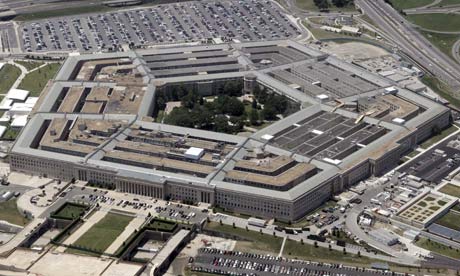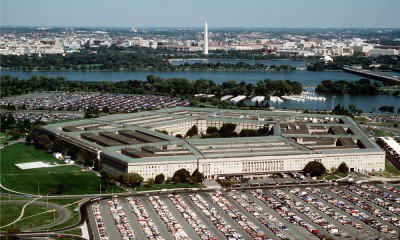“Deter, Deny and Defeat”: Pentagon [Mis]Labels Russia, China, Iran and North Korea as “Threats to Global Peace”
MILITARISM, 6 Jul 2015
Stephen Lendman – Global Research
The Pentagon’s new National Military Strategy (its first update since 2011) signaled possible major wars with US adversaries.
Washington named four nations threatening no others as major US security threats: Russia, China, Iran and North Korea – plus non-state groups like ISIS (without mentioning they’re US creations).
The document turns truth on its head blaming Russia for violating “numerous agreements” and “military actions.” It says Iran and North Korea seek nuclear weapons.
Pyongyang may have them – for self-defense, not offense. No evidence whatever suggests Tehran seeks them – now or earlier. Plenty of evidence reveals otherwise.
China is called a regional power challenging US hegemony. Pentagon strategy calls for “deter(ing), deny(ing), and defeat(ing)” nations it calls threats to US security, as well as “disrupt(ing) and degrad(ing) non-state groups.”
It says
“(n)one of these nations are believed to be seeking direct military conflict with the United States or our allies (but) pose serious security concerns which the international community is working to collectively address by way of common policies, shared messages and coordinated action.”
US Joint Chiefs Chairman General Martin Dempsey said American success
“will increasingly depend on how well our military instrument supports the other instruments of national power, and how it enables our network of allies and partners.”
The document states
“today, the probability of US involvement in interstate war with a major power is assessed to be low but growing.”
At the same time, so-called “hybrid conflicts” with non-state actors like ISIS, Al Qaeda, the Taliban and other US-created groups are likely to expand.
Post-9/11, Dick Cheney warned of wars not ending in our lifetime. Former CIA director James Woolsey said America “is engaged in WW IV, and it could continue for years.”
GHW Bush called it a “new world order” – endless US wars of aggression for unchallenged global dominance. The Pentagon’s 2006 Quadrennial Defense Review (QDR) called it the “long war” without end.
General Martin Dempsey says America
“now face(s) multiple, simultaneous security challenges from traditional state actors and trans-regional networks of sub-state groups – all taking advantage of rapid technological change.”
“We are more likely to face prolonged campaigns than conflicts that are resolved quickly.” America’s military must remain “globally engaged – in other words, wage permanent wars of aggression against invented enemies driven by lunatics in Washington wanting all independent governments replaced by US controlled puppet ones.
America intends “to project power across all domains…act in concert with others…or unilaterally (as) the situation demands,” the document states.
US military strategy includes “press(ing) forward with the rebalance to the Asia-Pacific, placing our most advanced capabilities and greater capacity in that vital theater.” It remains committed to NATO allies and Israel’s security.
Ashton Carter replacing Chuck Hagel as defense secretary in mid-February signaled more war besides ones America was waging before his appointment.
Obama’s naked aggression on Yemen followed weeks later. So did greater numbers of US combat troops operating in Iraq, continued bombing of its economic infrastructure on the pretext of attacking ISIS, and the same strategy ongoing in Syria – plus the Pentagon’s latest military strategy signaling endless US-initiated conflicts.
In May, General Dempsey announced his retirement effective October 1. Marine Corp commandant General Joseph Dunford, Jr. will replace him. His nickname “Fighting Joe” signals continued endless direct and proxy aggression – always against invented enemies.
US strategy of permanent wars against one country after another threatening no one for objectives impossible to achieve – combined with outlandish fear-mongering, unaffordable longterm military spending, and homeland police state control indicate a nation in decline like all previous empires.
Policies pursued are unsustainable for the long haul. What can’t go on forever, won’t. It’s just a matter of time before America’s hubris and imperial arrogance become its undoing.
What’s unknown is whether it’ll go with a bang or whimper. The former risks humanity going with it – the curse of potential nuclear armageddon.
________________________________
Stephen Lendman lives in Chicago. His new book as editor and contributor is titled Flashpoint in Ukraine: US Drive for Hegemony Risks WW III. http://www.claritypress.com/LendmanIII.html. He can be reached at lendmanstephen@sbcglobal.net.Visit his blog site at sjlendman.blogspot.com.
Go to Original – globalresearch.ca
DISCLAIMER: The statements, views and opinions expressed in pieces republished here are solely those of the authors and do not necessarily represent those of TMS. In accordance with title 17 U.S.C. section 107, this material is distributed without profit to those who have expressed a prior interest in receiving the included information for research and educational purposes. TMS has no affiliation whatsoever with the originator of this article nor is TMS endorsed or sponsored by the originator. “GO TO ORIGINAL” links are provided as a convenience to our readers and allow for verification of authenticity. However, as originating pages are often updated by their originating host sites, the versions posted may not match the versions our readers view when clicking the “GO TO ORIGINAL” links. This site contains copyrighted material the use of which has not always been specifically authorized by the copyright owner. We are making such material available in our efforts to advance understanding of environmental, political, human rights, economic, democracy, scientific, and social justice issues, etc. We believe this constitutes a ‘fair use’ of any such copyrighted material as provided for in section 107 of the US Copyright Law. In accordance with Title 17 U.S.C. Section 107, the material on this site is distributed without profit to those who have expressed a prior interest in receiving the included information for research and educational purposes. For more information go to: http://www.law.cornell.edu/uscode/17/107.shtml. If you wish to use copyrighted material from this site for purposes of your own that go beyond ‘fair use’, you must obtain permission from the copyright owner.

